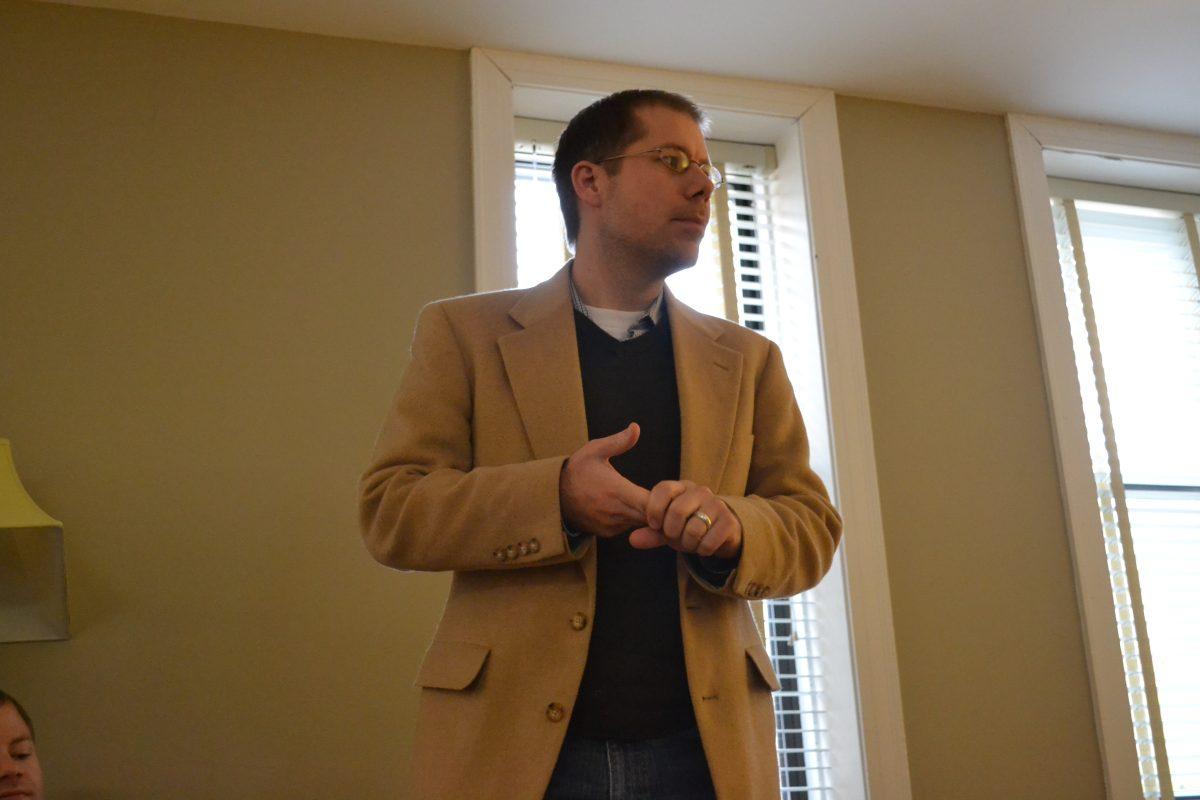
RAVI CHITTILLA/TECHNICIAN
Aaron Stoller founded Research Unplugged in the fall of 2011. It started as an opportunity for faculty members to share their research stories, and it has evolved into a weekly student-and-faculty discussion.
On any given Friday at 3 p.m. in the Berry Lounge, students and faculty members can be found discussing a wide variety of topics ranging from the future of geneti cally modified organisms to wealth and income inequality.
For the last three years, Aaron Stoller, associate director of the University Honors Program, has led Research Unplugged, a program that invites professors and students to participate in discussions about current topics. Through this medi um, participants are able to bring their own unique background and perspective to enrich the level of discussion.
“Research Unplugged puts the stu dents’ education into bigger terms. It makes their education not just be about a set of classes that they take to get a degree, but to be about big issues, big problems that are faced by society and understanding their major, but their discipline as a way to help and contribute to solving those,” Stoller said.
Stoller said he was inspired to create Research Unplugged when he came to N.C. State and noticed there were faculty-member presen tations and lecture series but not many opportunities for students to interact with their professors out side of class.
“I wanted there to be a space where faculty could really come in and tell their research story,” Stoller said. “The story behind why they got involved in their discipline and what are the things that interest them, rather than offering a lecture be cause we have enough lecture series that are all very good, but you don’t really get the story behind that. You just get the outcome — the product. You don’t really get the process. So we wanted to explore the process.”
For the first year, Research Un plugged started as just that: Fac ulty members came individually and told the students about their journeys from college freshmen to their current positions and how they began their research.
“That worked well, but what I found was the audience was not as diverse as I hoped,” Stoller said. “We’d have a physics professor come in, and most of the students who came were physics students.”
The program has evolved so that now all of the seminars are conver sations between faculty members and students about a wide variety of topics. To select topics, Stoller said he surveys students and looks at current events that will engage faculty members and students from different disciplines who might not necessarily come in contact with one another.
“That seemed to draw a much more diverse crowd, and it also seemed to be something that moved away from faculty talking at students to a more democratic dialogue,” Stoller said. “That was really what we wanted: a place where students felt comfortable asking questions.”
On any given week, the event will attract anywhere from 35 to 40 people, Stroller said.
“Every time I go, the faculty are surprised, ‘Oh my gosh, you didn’t even have to offer pizza, and it’s Friday afternoon,’” Stoller said. “People want to be here. People en joy it; people want to get engaged about issues.”
There are still a few goals Stoller has in mind for the program. For example, he would also like students and faculty members to be able to get to know each other outside of class and for students and faculty members from different concentra tions to exchange ideas.
“Right now, I’m working on ac tively recruiting faculty to come, but I would love to get to a moment where it just becomes something we do on a Friday afternoon,” Stoller said. “Maybe you are a graduate stu dent or a faculty member and you don’t even know the topic, but you can show up.”
William Crumpler, a sophomore in material science and engineering, has attended Research Unplugged regularly since last year.
“I am hoping that the model of Research Unplugged will be incor porated by other villages and or ganizations across campus, which will help build an increased sense of academic community among the students and professors and provide the opportunity for students to truly engage with their education in a way that is impossible for many in their traditional classroom settings,” Crumpler said.
Next semester, the seminars will include discussions about open ac cess, the practice and economics of fracking in North Carolina, pol lination and agriculture in North America and will feature Chancel lor Randy Woodson who will speak about the future of N.C. State.
“Education is more than just a set of classes. It’s really about engag ing yourself in ideas and investing yourself in a community of people,” Stoller said. “Research is not this mechanical activity, nor is it like a club you’re a member of. Research is really an extension of who you are, where you find yourself in the world, and what you hope to contribute to the world.”